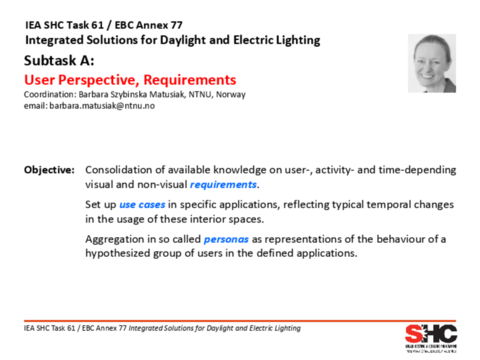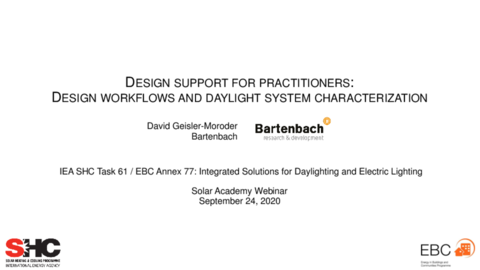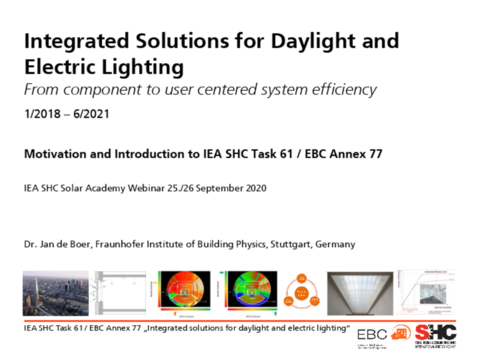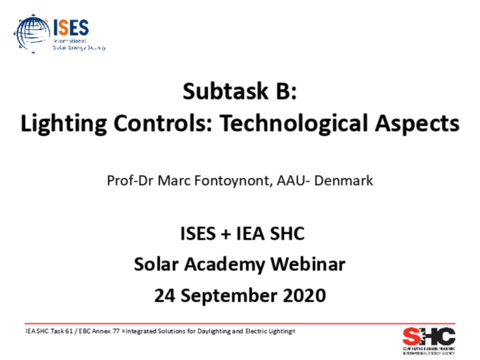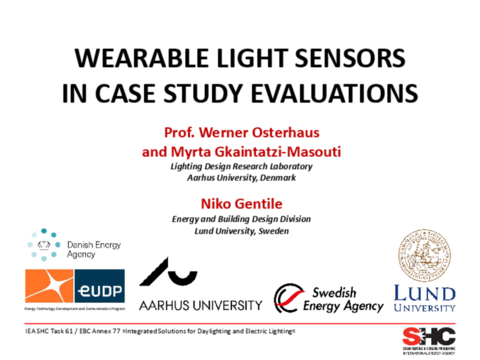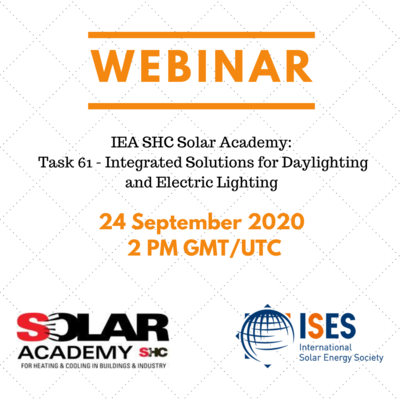
IEA SHC Solar Academy: Webinar on Task 61 - Integrated Solutions for Daylighting and Electric Lighting (1)
This fourth webinar in the IEA SHC Solar Academy webinar series will introduce the work of IEA SHC Task 61 on solutions for daylighting and electric lighting.
Task overview:
Lighting accounts for approximately 19% of the global electric energy consumption. Research and development in the field of energy-efficient lighting techniques encompassing daylighting, electric lighting and lighting controls potentially can contribute significantly to reduce this demand. Nonetheless, growing economies, higher user demands for quality lighting and rebound effects as a result of low priced and more versatile electric lighting – “more for less” – lead to an absolute increase of the worldwide lighting energy consumption. More light is used, less consciously.
The lighting as well as the façade market have seen significant technological developments and strong growth in the past decade - where nevertheless both market sectors still act mainly completely independent of each other, leaving out big chances for better user-centered and at the same time efficient systems.
Research and developments in the field of energy efficient lighting techniques that integrates daylighting, electric lighting and lighting controls is thus needed. The ultimate goal is employing this integrated approach and bringing these techniques to the market which can reduce significantly worldwide electricity consumption and CO2 emissions. These activities will therefore be in line with several different governmental energy efficiency and sustainability targets.
The webinar will welcome the following presentations:
- Jan de Boer - Motivation and Introduction to Task 61
- Barbara Szybinska Matusiak - User requirements for lighting environments
- Marc Fontoynont - Technical Solutions for simplified maintenance, improved reliability, user-friendliness in design and application of systems
- David Geisler Moroder - Design support for practitioners – simulation workflows and daylight system characterization
- Werner Osterhaus + Niko Gentile - Instruments and methods for assessing integrative/circadian lighting systems in health environments and offices
The webinar will be moderated by Bärbel Epp of solrico - solar market research & international communication.
Q/A Session: The 90-minute webinar will include a 30 minutes Q/A session and a recording will be available online afterwards.
The webinar is organised by the Solar Academy of the IEA Solar Heating and Cooling Program and hosted by ISES, the International Solar Energy Society.
Special announcement - webinar re-run on 25 September 2020 at 6 AM GMT/UTC
ISES and the IEA SHC Solar Academy are happy to announce that this webinar will also take place on 25 September 2020 at 6 AM GMT/UTC to accommodate our global audience especially from Australia and Asia.
To learn more and register for the webinar on September 25, please visit this page.
Presentations
Speakers
Jan de Boer
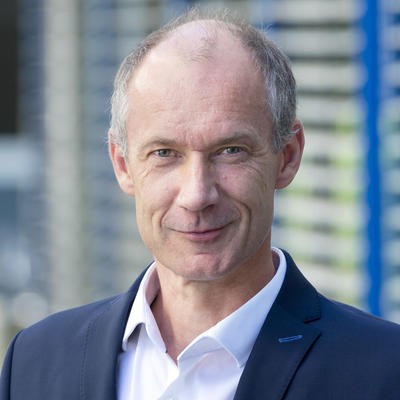
Jan de Boer is the Group manager for Lighting Technology and Passive Solar Systems at the Fraunhofer Institute for Building Physics (IBP) in Stuttgart. He is also a member and coordinator of several standardization commissions and working groups on energy-efficient lighting. From 2013 until 2015 he was an operating agent at IEA-SHC Task 50 "Advanced Lighting Solutions for Retrofitting Buildings".
Since 2018, he is an operating agent at IEA-SHC Task 61 / EBC Annex77 "Integrated Solutions for Daylighting and Electric Lighting".
Presentation Title: Motivation and Introduction to Task 61.
Barbara Szybinska Matusiak
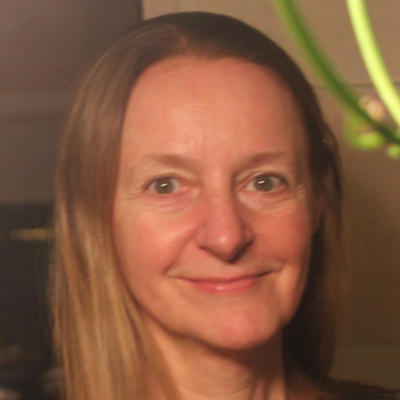
Barbara is Head of Energy & Environment Group at Norwegian University of Science and Technology, she is also a professor at the Department of Architecture and Technology. She is trained as an architect, has 6 years practice from architecture offices and 15 years of experience as a teacher and scientist. Subtask A leader of IEA-SHC Task 61 / EBC Annex 77.
Presentation title: User requirements for lighting environments.
Marc Fontoynont
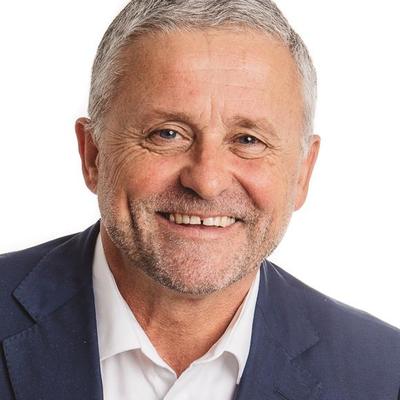
Marc is a Professor at the Danish Building Research Institute (SBI), Aalborg University Copenhagen. Convenor of CEN Standardization group TC 169-WG11 Daylight. He is also active in various innovative programs dealing with developing new lighting techniques, including reduction of energy use, higher human well-being, and developing techniques to facilitate decision-making by groups of stakeholders in the field of construction, design and city planning, with participants sharing VR environments on the internet.
Presentation Title: Technical Solutions for simplified maintenance, improved reliability, user-friendliness in design and application of systems.
David Geisler Moroder
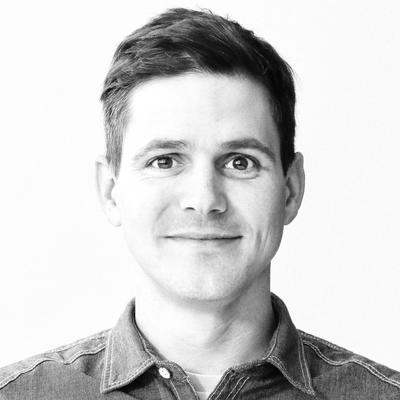
David Geisler-Moroder studied at the University of Innsbruck, Austria where he achieved a master and a PhD degree in technical mathematics. Already in his diploma and doctoral thesis he worked on mathematical questions in lighting technology. Since 2010 he has been working as a project manager and head of the competence field daylight in the R&D department of Bartenbach. His main work and research areas include the development of simulation methods, the interface between daylighting and building physics, daylighting systems, and lighting technology principles.
Presentation Title: Design support for practitioners – simulation workflows and daylight system characterization.
Werner Osterhaus
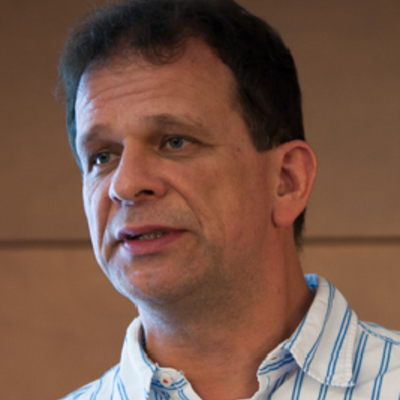
Werner is an architect, lighting designer and Professor of Lighting Design Research at the Department of Engineering at Aarhus University in Denmark. Werner has been involved in daylighting research and design since he first started working with Lawrence Berkeley National Laboratory’s Windows and Daylighting research group in 1987. Since 1994, he has been a full-time academic in architecture in the USA, New Zealand and Germany, and since 2009 in architectural engineering in Denmark. He focuses on lighting design, sustainable architecture and building environmental science.
Niko Gentile
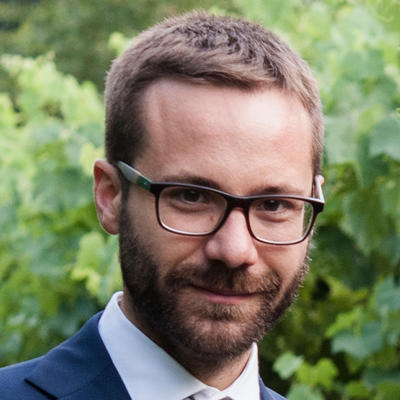
Assistant professor at the Institute of Architecture and the Built Environment, Lund University, Sweden. In the past eight years, Niko has been working in the field of lighting and daylighting, mixing technical and observed-based evaluations. His research focuses on the role of the user in driving energy saving, targeting mainly at the role of lighting controls. Niko participated in the International Energy Agency (IEA) SHC Task 50 and he is currently leading Subtask D of IEA SHC Task 61 / EBC Annex 77 together with Prof Werner Osterhaus.
Presentation Title: Instruments and methods for assessing integrative/circadian lighting systems in health environments and offices.
Bärbel Epp - Moderator
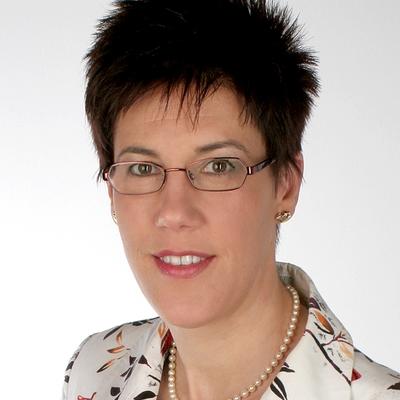
Bärbel Epp is the founder and managing director of the German consultancy solrico – solar market research & international communication. She is responsible for the international newsletter on the web portal www.solarthermalworld.org, reporting exclusively about market and technology trends in the solar heating and cooling sector. solrico also published the first World Map of SHIP suppliers (SHIP = Solar Heat for Industrial Processes) see www.solar-payback.com/suppliers and carries out surveys among the around 80 companies listed on the world map. Since three years Bärbel Epp is also author of the SHC chapter of the Annual Global Status Report on Renewables published by REN21.
Sponsors
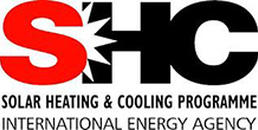
IEA Solar Heating and Cooling Programme
The International Solar Energy Society is a sponsor of the International Energy Agency’s (IEA’s) Solar Heating and Cooling (SHC) Programme. This development offers expanded opportunities for ISES members to participate in technical activities under the SHC Programme, and places ISES at the SHC table as a member of its Executive Committee.The Solar Heating and Cooling Programme was established in 1977, one of the first programmes of the International Energy Agency.
